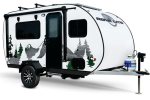How to Winterize a Camper
When winter is coming, do not forget to winterize your camper! It's a recipe for great vacations next year!
In order to have a camper in a good condition that lasts for many years you should always prepare it for winter.
In the fall when the time of camping is over you can follow this list thus making sure that the camper will be in a great condition also after the cold days of winter have passed.
A lot of people winterize their campers at their RV dealer, but you can also do it yourself and save some money.
Draining the water
Draining the water tanks of the camper should be the most important thing to do before winter. If the water freezes inside the tank and the pipes, they will break and you will have to replace them after winter.
All water tanks (fresh or gray) can be drained at a sanitary dump station. Remember to remove water also from the water heater. Before you do this make sure it is not under pressure and that the water is not hot. Water can be also sometimes trapped in the faucets, pumps and drains, so you also have to make sure that these won't freeze and brake.
To avoid this you will need some non toxic anti freeze which you can find in most shops. Using a pump or a tube get this solution into the pipes, lines and the whole water system of the camper. When you turn the faucets on, the anti freeze liquid should be pouring out. This way you know that it got into every little corner of the water system.
Covering up the camper
Covering the camper with a plastic seems to be the simplest solution but it is not the best one. Water can leak underneath the cover or moisture will form which will damage the camper over winter. Trapped moisture is the worst enemy of a camper, because it will form mildew.
The best way to make sure that your camper will be mildew free in the spring is using a material that keeps moist away but that is breathable. You can find special camper covers in RV stores that are made of a material which has exactly these features. Such a cover will make sure that no water will damage your camper from the outside.
From the inside you also need to protect your camper from moisture that forms in the air. For this you should use a chemical absorbent inside the camper which will absorb moisture from the air. Some people use a heater instead but this is less safe and more energy consuming.
Small but important things
After you are done with these major steps, don't forget about the smaller things either. Clean the camper inside and outside thoroughly. Look carefully around the camper and if you see anything that needs to be fixed, do it before storing it.
Also make sure that you don’t leave any food or other products in the camper that will attract insects and rodents. To avoid mice or other critters moving into the camper fill in any whole or stuff them with brass wool. Unfortunately some insects are almost impossible to keep out of the camper, but before you use it in spring check carefully for any creatures especially in the exhaust ports and propane systems.
Visitor's Story
If you live in Texas or Utah, you may not have to winterize your camper.
However, if live in the colder states, you will want to take care of the camper before the cold weather affects the camper. Most people say that winterizing is a matter of choice in a pop up camper.
Whether you have a 1994 camper or a 1979 camper you still want to take care of certain things so they do not freeze in the cold weather. Water systems need to be drained and all water removed from the hoses or pipes as you might say.
If they freeze solid, they can expand and break. You need to remove water that has exposure to the cold and freezing temperatures. If the water is not drained from the pump, this may freeze and have to be replaced.
Replace the water with antifreeze after you use air pressure to clear all water from the pipes. You can drain the water from the fresh water tank by removing the plug and letting the water drain. Then replace the plug and add the antifreeze.
Add enough water to dilute the antifreeze to the proper degrees. Always use the antifreeze made for campers because it is non-toxic.
You also want to drain the hot water heater and let all the water out if you are not keeping it running. Once you have all this done and reconnected you can turn on the faucets and run until you see pink water start coming out.
You have now learned how to winterize a camper for the colder seasons when not in use. If you have any problems finding any areas that need to be drained, refer to your camper’s manual to locate the necessary drain plugs and bypass hoses. Winterizing your camper is not hard nor is it something to be ignored.
.
About Us / Privacy Policy / Resources
Go from How to Winterize a Camper to Pop Up Campers Trailer Home
5th Wheel Campers / Pop Up Camper Tires / Wheel Chock for Campers / Mini Truck Campers


